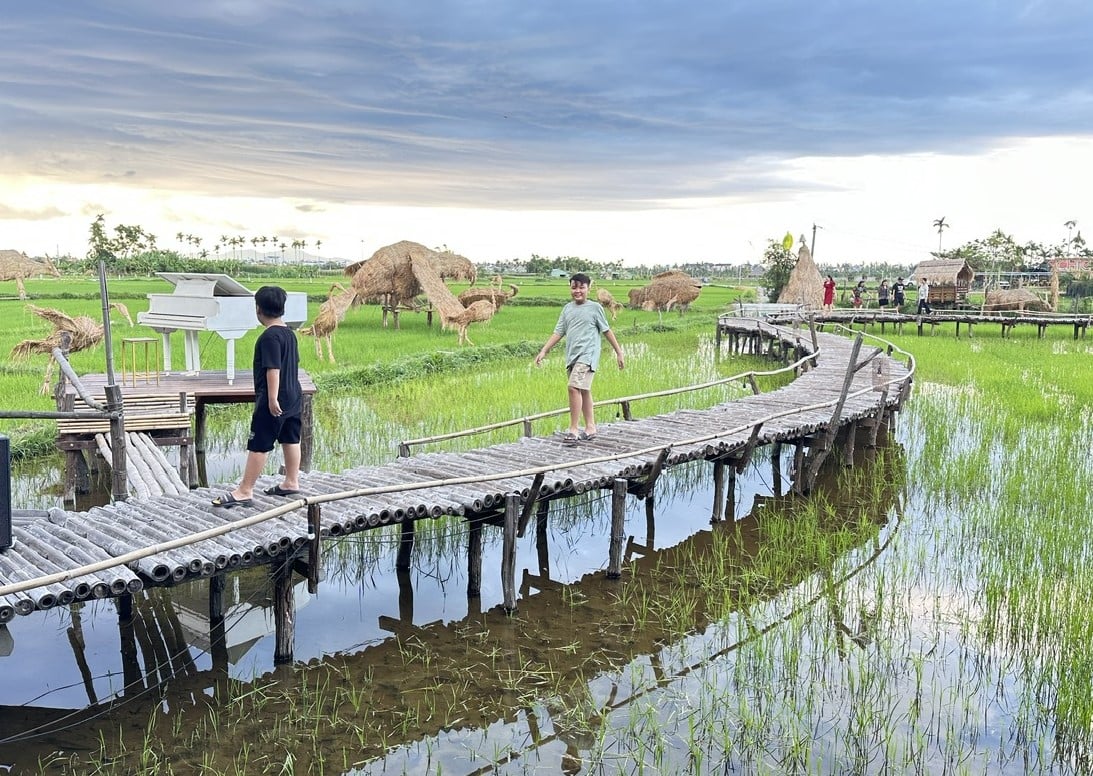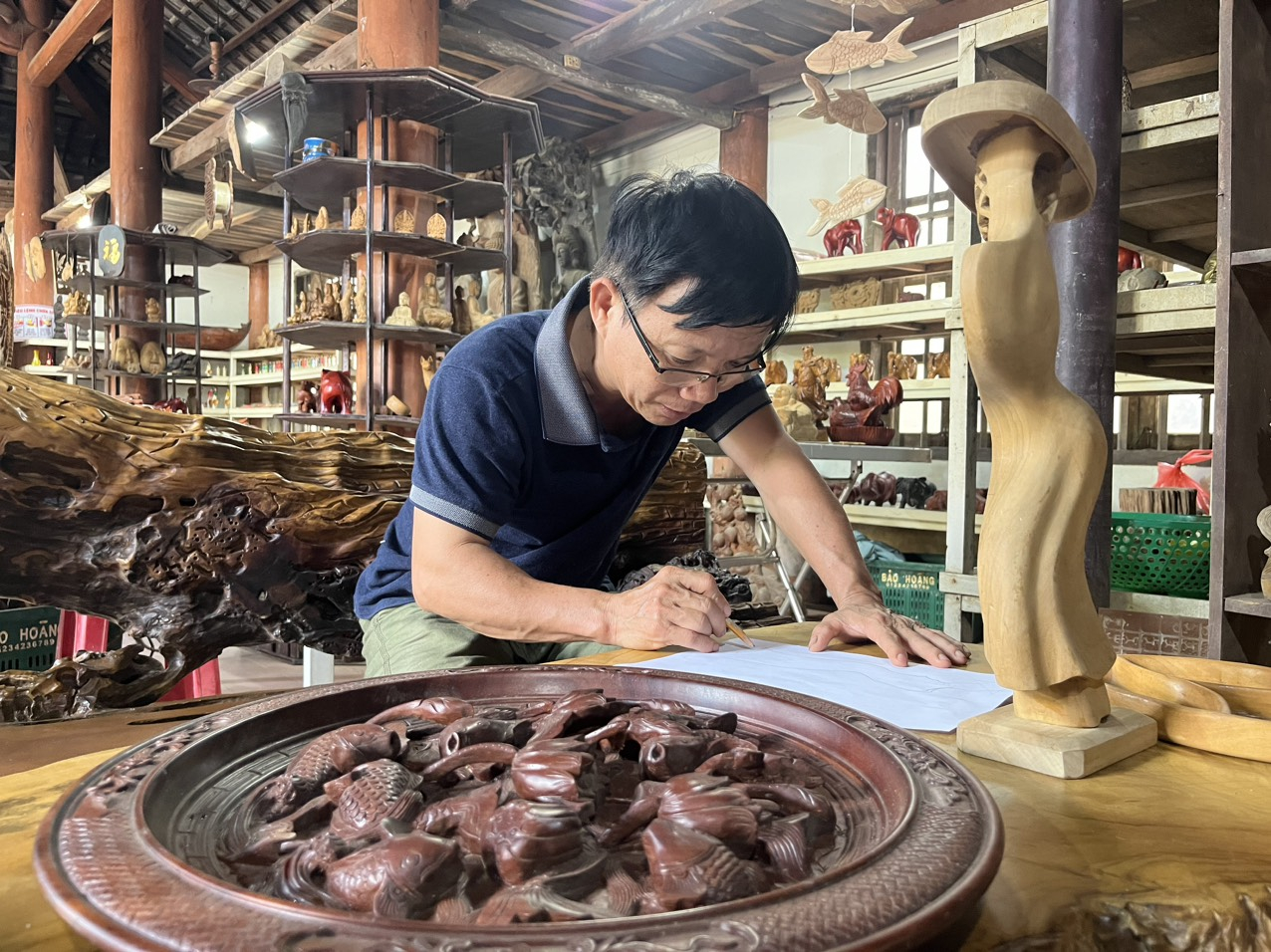November 27, 2025 | 15:41 GMT +7
November 27, 2025 | 15:41 GMT +7
Hotline: 0913.378.918
November 27, 2025 | 15:41 GMT +7
Hotline: 0913.378.918

Quang Nam province has numerous advantages to developing rural community tourism. Photo: LK.
Quang Nam has unique advantages to develop rural tourism compared to other provinces and cities in Vietnam. These advantages include well-known sites such as the Tra Que vegetable village, Thanh Ha pottery village, An My vegetable village, Cu Lao Cham fishing village, Kim Bong carpentry village, Cua Khe traditional fish sauce village, and Loc Yen ancient village.
The agricultural and rural tourism products from these villages have contributed to diversifying the service range. Additionally, they reduce the pressure on Quang Nam province's main tourist destinations including Hoi An ancient town and My Son cultural heritage. On the other hand, rural tourism also helps to improve livelihoods, create employment opportunities, and improve income and quality of life for farmers.
Quang Nam province plans to deploy three new models in 2023, including a model of community tourism in association with indigenous cultural values and natural ecosystems in Kim Bong Carpentry Village, Cam Kim commune, Hoi An city; a model of eco-tourism development in Muong Village community, Tra Giang commune, Bac Tra My district; a model of community tourism development in association with the traditional Cua Khe fish sauce craft village in Binh Duong commune, Thang Binh district.

The rural tourism model will be implemented in three locations in Quang Nam province by 2023, one of which is the Kim Bong Carpentry Village in Hoi An City. Photo: LK
In addition to these pilot models, the Division of Tourism Management under Quang Nam province's Department of Culture, Sports, and Tourism will implement general support activities for rural tourism development within the province. These activities include training, organizing field trips to farms, surveying press trips, consulting on the development of tourism programs, and connecting rural tourist destinations in Quang Nam province with surrounding areas. Furthermore, the Division plans to develop media that promote rural tourism products and advertise on television programs, social networking sites, and so on.
On the other hand, the development of rural tourism in association with new rural construction in Quang Nam is facing numerous difficulties and challenges. According to the former new rural construction planning, local governments have not focused on tourism development, including community tourism. Moreover, certain provinces and cities' tourism development planning falls short of expectations. There is also a lack of regional and industrial linkages for tourism development.
In addition, the infrastructure for rural tourism development is inadequate, and the traffic system is relatively disjointed. Rural tourism workers have limited capacity and professional skills. The variety of typical tourism products and services is limited. Furthermore, inconsistent numbers of tourists at popular attractions result in low revenue from tourism-related activities.
As a result, Ms. Nguyen Thi Linh Phuong, Deputy Head of the Division of Tourism Management, believes that it is necessary to conduct extensive planning and investment in rural tourist destinations to boost the effectiveness of tourism models as well as ensure the safety of the landscapes and environment. Additionally, the province needs to attract investors to large-scale and high-quality agricultural tourism products and ensure that the community can participate and benefit from this tourism product.
The leadership of local governments must be strengthened to prevent the duplication and monotony of tourism products as well as the overexploitation of available natural resources, which can adversely affect the environment. Moreover, the province can enlist the support of international organizations in the promotion of rural tourism development.
“In the immediate future, Quang Nam province will prioritize and invest resources to implement several promulgated mechanisms, policies and projects such as: economic development of orchards and farms, one-commune-one-product (OCOP) program, craft village policies among many others. The province aims to integrate and effectively implement credit policies; policies to attract businesses' investment in agriculture and rural areas;policies on environmental protection. Quang Nam will also develop a mechanism to support the development of rural tourism and community tourism. Accordingly, priority will be given to support loans in order to encourage investment in rural tourism", shared Ms. Nguyen Thi Linh Phuong.
The developlemt of rural tourism is a crucial and urgent solution to promote the sustainable construction of new rural areas. However, the implementation of these tourism models have seen significant challenges and limitations.
Translated by Nguyen Hai Long
/2025/11/26/4909-2-154329_878.jpg)
(VAN) Pearl grouper farming in HDPE cages not only delivers economic efficiency but also contributes to protecting the environment, creating jobs, and promoting marine-based experiential tourism.

(VAN) The model of making a living under the forest canopy through the agroforestry system in Van Son commune, Bac Ninh province, is expected to generate an annual income of approximately VND 30 million/ha.

(VAN) Many enterprises in Can Tho are harnessing natural energy and reducing greenhouse gas emissions in their production processes, thereby contributing to the promotion of a sustainable green transition.
/2025/11/24/3536-2-112800_176.jpg)
(VAN) Dong Nai now has tens of thousands of hectares of forests certified for sustainable management, and this area will continue to be expanded in the coming period.

(VAN) Vinh Ha hamlet (Dai Xuyen commune, Hanoi) is shifting away from small-scale farming as households adopt bioscurity into their breeder chicken models.

(VAN) Heavy rains make aquatic species more vulnerable to disease. Proactive water management and high-tech systems help farmers prevent outbreaks and protect yields.

(VAN) Greenhouses are shifting production mindsets in Binh Lu commune, enabling farmers to ‘weather the sun and rain’ and secure stable vegetable harvests throughout the year.